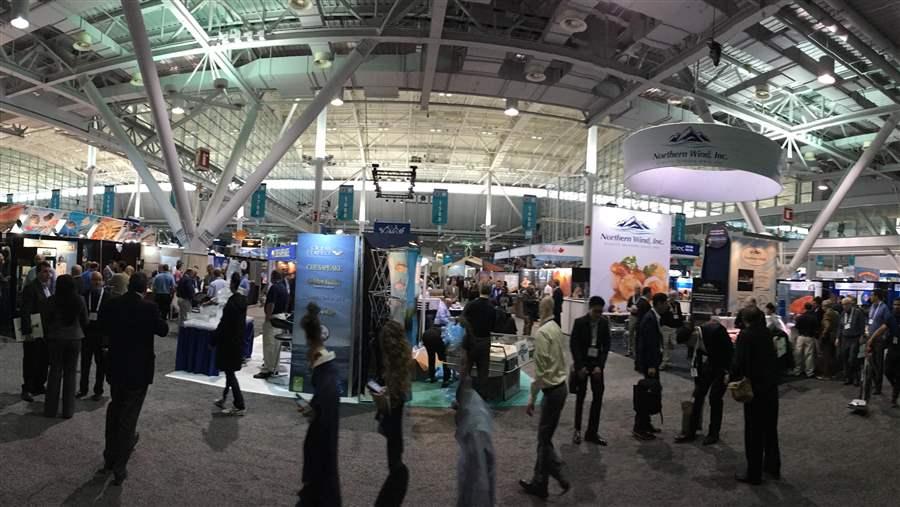Keeping Illegal Seafood off the Shelf: All Hands on Deck
Supply chain companies can make changes to help catch bad actors—and reward good ones

Seafood industry representatives on the showroom floor at the Seafood Expo North America in Boston.
© Mark Richardson/The Pew Charitable Trusts
This blog was been updated on June 27, 2017 to reflect the current number of countries in FISH-i: Africa
Earlier this year, The Pew Charitable Trusts identified ways to engage companies in the seafood supply chain to reduce illegal, unreported, and unregulated (IUU) fishing. The goal of these efforts is to pinpoint how policy implementation and enforcement can help prevent illicit catch from entering the nearly $150 billion global seafood trade that takes place each year. Estimates show that up to 26 million tons of fish—worth up $23.5 billion—are stolen from the seas each year. That equates to up to 1 in 5 fish sold.
In support of this aim, Pew staff this spring joined thousands of industry insiders at two of the largest seafood exhibitions in the world, in Boston and Brussels, followed by a visit to Seattle to attend the SeaWeb Seafood Summit. The first two expos provided us opportunities to learn from importers, exporters, wholesalers, hotels, restaurants, and supermarkets from over 140 countries about how IUU fishing is affecting their businesses. The SeaWeb summit brought us together with our peers to discuss future work and join the global seafood industry in celebrating the announcement that FISH-i: Africa, a partnership among eight southeast African governments to fight illegal fishing, had won the Seafood Champion Award for Innovation.
For more than a decade, Pew has worked to end IUU fishing through national and international policy, regional collaboration, and—most recently—the use of satellite-based systems to detect and track suspected illegal activity on the water.
At the expos, employees from across the seafood industry cited issues ranging from how to best track and trace seafood in a transparent and meaningful way and consumer attitudes on seafood sustainability to how plastic pollution in the ocean is affecting their business.
These conversations gave us the opportunity to better understand the perspective of the industry, so we can look toward developing solutions with them that will help eliminate IUU fishing products from their trade.
At the Seafood Expo North America in Boston, we facilitated a panel on reducing the risk of illegal seafood throughout supply chains. The panelists discussed how industry can increase transparency and accountability within their supply chains, for example through better use of vessel identification and risk assessment systems and partnerships among government, industry, and nongovernmental organizations. The panelists also noted that leveraging legal frameworks already in place, such as the Port State Measures Agreement, could go a long way toward keeping illegally caught fish from entering ports.
The 25th Seafood Expo Global in Brussels afforded us the chance to meet with wholesale buyers, and representatives of the U.N. Food and Agriculture Organization and the European Commission. All three groups told us resoundingly that EU consumers expect their seafood to be both legal and sustainable, but to date that expectation hasn’t always been met. To ensure that it is will require the proper implementation of national and regional regulations coupled with adequate monitoring of fishing vessels. In conjunction with our efforts to help seafood buyers use IUU data when undertaking their risk assessments, we aim to lessen the burden on businesses in making complex supply chains more transparent for consumers.
Further expanding our work into the seafood market will help Pew’s ending illegal fishing project better understand the challenges and ambitions of seafood buyers seeking to keep illegally caught fish out of their supply chains. This in turn will help us work with buyers to develop policy commitments and assessment tools to reduce noncompliance within their seafood supply chains.
In Boston and Brussels, we took important steps toward building a partnership with the seafood industry in the fight to end illegal fishing. We look forward to growing that collaboration for the long-term benefit of consumers and all those throughout the supply chain who work within the law.
Huw Thomas manages market engagement for The Pew Charitable Trusts’ ending illegal fishing project.










